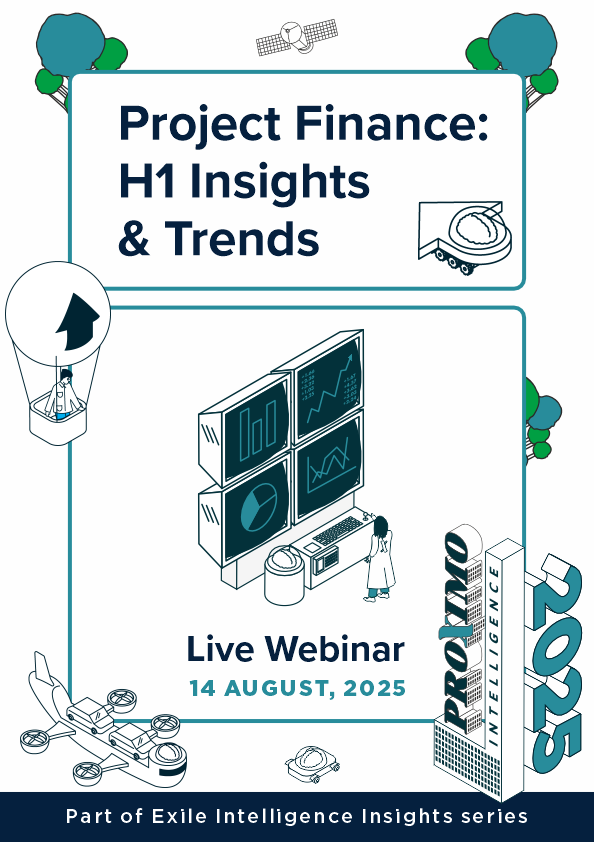Proximo Weekly: Hot air on a G string?
Given the difficulty of structuring major infrastructure investments in certain markets - lack of international standards of transparency and regulation - can and will state-backed ECAs take a lead in giving the G (governance) more volume in the ESG mix?

JP Morgan Chase has just announced it intends to lend, invest and provide financial services for up to $2.5 trillion of banking business for companies and projects tackling climate change and social inequality over the next decade. And the bank is not alone – environment, social and governance (ESG) is the buzz phrase in infrastructure finance and investment.
But the G in ESG is rarely given the focus that the E and S get in the majority of transactions, and despite being state-backed entities, the ECA side of the infrastructure finance sector is no exception. For export credit agencies (ECAs), the big G, as one European ECA (off the record) says, is, “candidly, a mixed picture that we’re not ready to talk about yet.” He adds: “We are playing an active role in green transactions and obviously we analyse and look at the governance of transactions, which is mandatory, but we don’t yet have the ability beyond our direct relationships with deals to translate that into wider comment on [governance] in ESG. Hopefully, in the near future, we will.”
Export Finance for Future (E3F) coalition is a welcome initiative launched on 14 April. It brings together seven governments such as France, Denmark, the Netherlands, Germany, Spain, Sweden and the UK. These governments are announcing they will adhere to a set of principles to “better integrate climate policy objectives in public export finance”. Many ECAs are also embracing mandatory reporting initiatives such as the EU taxonomy. This is a classification system establishing a list of environmentally sustainable economic activities (using standardised definitions).
Another part of the EU’s approach is the Sustainable Finance Disclosure Regulations (SFDRs). This means asset managers will have to make the information on their sustainability claims public (Level 1 SFDR came into operation on 10 March and Level 2 Regulatory Technical Standards will start to phase in from next January). While not perfect, SFDRs will have an impact on the corporate constituents of funds because fund managers will be looking more closely at “sustainability/’green’ activities and claims”. In short, the EU SFDRs do not mention ESG. Neither does it explicitly aim to cover social and governance aspects.
Meanwhile, the US Securities and Exchange Commission (SEC) has been making it clear it wants better disclosure on ESG. Its focus remains on disclosures to investors in funds, and its vision is closely directed toward climate risks, following the creation of a taskforce on climate and ESG on 4 March and a new website launched on 22 March. It will be looking at material gaps or mis-statements in disclosures of climate risks under rules that already exist and will look closely at investment advisors and funds compliance and disclosure on ESG. For governance, to quote directly from the SEC, fund managers (specifically), “focusing on ESG generally examine criteria within the environmental, social, and/or governance categories to analyse and select securities…the governance component might focus on issues such as how the company is run – for example, transparency and reporting, ethics, compliance, shareholder rights, and the composition and role of the board of directors.”
The Financial Stability Board (an international body that monitors and makes recommendations about the global financial system) has a Task Force on Climate-related Financial Disclosures (TCFD) that delivered a status report last September. In this, regarding governance, according to a study by Vigeo Eiris Analysts (which looked at the degree to which climate-related risks and opportunities have been incorporated into governance, strategy, and risk management structures for a given company and to see how they aligned with the TCFD recommendations) only 11% of companies disclosed at least one element that is recommended by the TCFD in this pillar. Comparing across regions, a larger share of companies in Europe and North America disclosed on governance.
ESG raters such as Sustainalytics, MSCI and ISS (among others) do provide companies (most predominantly in the developed world) with ratings/information that include extensive governance metrics. But what practically can ECAs do to improve governance? Social and governance-related risks are particularly high in markets that many ECAs are keen to export to, notably Africa. Exporters have a key role to play to stand against governance issues such as bribery and corruption and to meet the governance elements of ESG, but they may need more help from governments. Good governance and strong enforcement of anti-bribery and corruption in jurisdictions is not necessarily being translated into export markets.
Mark Norris, Partner at Sullivan and Deputy Chair at British Exporters Association (BeXA) notes there is an opportunity for ECAs and related departments such as trade and foreign affairs to offer practical help with governance in doing deals in countries that are low on Transparency International rankings, particularly for SME exporters, a segment ECAs profess they are keen to encourage. Transparency International’s ‘Global Corruption Barometer – Africa’ highlighted that more than one out of four people – around 130 million people in the 35 African countries surveyed – had paid a bribe to access essential public services such as health care and education. The UN has highlighted bribery and corruption is of ‘one of the biggest impediments to achieving the Sustainable Development Goals (SDGs).’
Norris says: “The UK prides itself on having some of the toughest anti-bribery legislation. Given the important role that trade and exports can have in meeting the UN’s SDGs it is important that anti-bribery legislation does not act as a drag on exporters. The cost of compliance can be significant for SME exporters. This is not to say that the legislation should be watered down but rather to ensure that the cost of compliance does not become a barrier to exporting, governments need to be more proactive in supporting exporters to address these risks.”
Selected news articles from Proximo last week
NORTH AMERICA
Roadis makes unsolicited proposal for I-25
Public Sector Pension Investment Board (PSP Investments) platform Roadis USA Holding has submitted an unsolicited proposal to the Colorado Department of Transportation (CDOT).
EUROPE
Wheelabrator acquisition financing in syndication
First Sentier Investors' £1.6 billion acquisition financing for its purchase of Wheelabrator UK from Macquarie is in syndication.
ASIA-PACIFIC
Renascor investigates green financing options for Siviour project
Renascor Resources is investigating green financing options for the Siviour Battery Anode Material Project, in South Australia.
MIDDLE EAST & AFRICA
Redstone CSP PPA amendment signed
A PPA amendment with Eskom for the $750 million Redstone concentrated solar power (CSP) project in South Africa has been signed, according to a source with knowledge of the project.
LATIN AMERICA
2W Energia secures loan for Anemus wind complex
Brazilian energy trader 2W Energia has closed a $45 million loan agreement with Darby International Capital and will use $35 million for the construction of its 138MW Anemus wind complex.
The Proximo Membership
Join a brand new community of project finance professionals getting unrivalled access to unique analysis, market data and a global portfolio of expert industry events in the energy and infrastructure space. Click here to find out more





